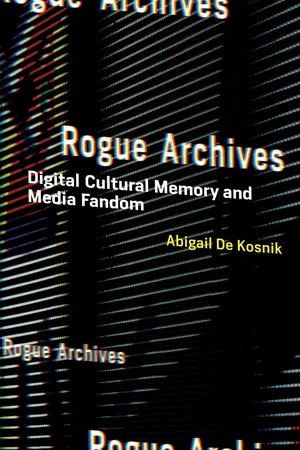
- English
- ePUB (mobile friendly)
- Available on iOS & Android
About this book
The task of archiving was once entrusted only to museums, libraries, and other institutions that acted as repositories of culture in material form. But with the rise of digital networked media, a multitude of self-designated archivists—fans, pirates, hackers—have become practitioners of cultural preservation on the Internet. These nonprofessional archivists have democratized cultural memory, building freely accessible online archives of whatever content they consider suitable for digital preservation. In Rogue Archives, Abigail De Kosnik examines the practice of archiving in the transition from print to digital media, looking in particular at Internet fan fiction archives.
De Kosnik explains that media users today regard all of mass culture as an archive, from which they can redeploy content for their own creations. Hence, "remix culture" and fan fiction are core genres of digital cultural production. De Kosnik explores, among other things, the anticanonical archiving styles of Internet preservationists; the volunteer labor of online archiving; how fan archives serve women and queer users as cultural resources; archivists' efforts to attract racially and sexually diverse content; and how digital archives adhere to the logics of performance more than the logics of print. She also considers the similarities and differences among free culture, free software, and fan communities, and uses digital humanities tools to quantify and visualize the size, user base, and rate of growth of several online fan archives.
Frequently asked questions
- Essential is ideal for learners and professionals who enjoy exploring a wide range of subjects. Access the Essential Library with 800,000+ trusted titles and best-sellers across business, personal growth, and the humanities. Includes unlimited reading time and Standard Read Aloud voice.
- Complete: Perfect for advanced learners and researchers needing full, unrestricted access. Unlock 1.4M+ books across hundreds of subjects, including academic and specialized titles. The Complete Plan also includes advanced features like Premium Read Aloud and Research Assistant.
Please note we cannot support devices running on iOS 13 and Android 7 or earlier. Learn more about using the app.
Information
Table of contents
- Cover
- Title page
- Copyright page
- Dedication
- Table of Contents
- Acknowledgments
- Introduction
- Break 0 A Glossary of Key Terms
- 1 Memory Machine Myth: The Memex, Media Archaeology, and Repertoires of Archiving
- Break 1 Canon and Repertoire
- 2 Archival Styles: Universal, Community, and Alternative Digital Preservation Projects
- Break 2 Archive Elves
- 3 Queer and Feminist Archival Cultures: The Politics of Preserving Fan Works
- Break 3 Fan Time versus Media Time
- 4 Repertoire Fills the Archive: Race, Sexuality, and Social Justice in Fandom
- Break 4 “Works” or “Performances”?
- 5 Print Fans versus Net Fans: Women’s Cultural Memory at the Threshold of New Media
- Break 5 A Femslash Parable of the Print-to-Digital Transition
- 6 The Default Body and the Composed Body: Performance through New Media
- Break 6 Body and Voice in Fan Production
- 7 Archontic Production: Free Culture and Free Software as Versioning
- Break 7 Licensing and Licentiousness
- Conclusion Fan Data: A Digital Humanities Approach to Internet Archives
- Appendix: Oral History Project, Demographics, and Ethical Considerations
- References
- Index